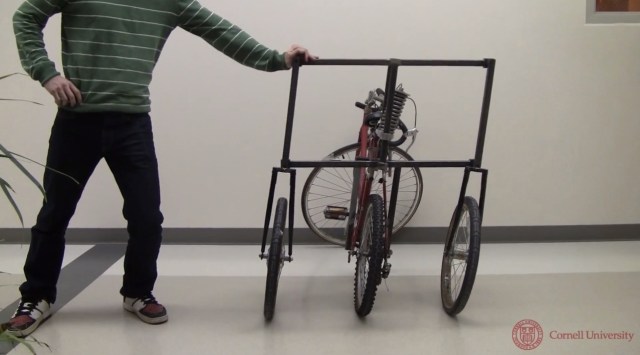Cornell University Invented a Bike You Can’t Steer… For Science?
Congratulations, we guess?

Meet the “Bricycle” — a modified bicycle built by Cornell University engineers to test what it would be like to ride a bike in zero gravity. What they found is that although we blame gravity when we fall off a bike, without it, you’d be unable to steer.
The additional wheels and spring on the bricycle are what give it the ability to sort-of defy gravity. By releasing the spring completely the bricycle functions just like a regular bike that happens to be dragging two extra wheels. You can steer and turn like you normally would. If you lock the spring in place, the bricycle functions more like a tricycle. You steer with the front wheel only and no turning.
The real magic of the bricycle comes when you adjust the spring tension to the critical point where it acts like a bike would in zero-gravity (assuming the wheels were magnetically sticking to the floor or something.) The rider can lean left or right without falling, but that lean does not affect the steering like it would normally.
Let this video demonstrate what I’m talking about:
So leaning doesn’t impact your steering in zero-gravity, and turning the wheel causes you to lean. The result is a complete lack of ability to steer the bricycle, making it the world’s most useless mode of transportation.
(via Cornell University, image via Cornell)
- Here’s a bicycle that lays out bubble wrap for you to ride over
- Bicycle/umbrella jousting is a thing at the Chap Olympiad
- Make your own bike lanes with lasers
Have a tip we should know? tips@themarysue.com